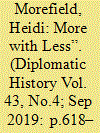| Srl | Item |
| 1 |
ID:
139826


|
|
|
|
|
| Summary/Abstract |
The Yugoslav Federation never satisfactorily resolved the problem posed by the Albanians of Kosovo. Emerging from a period of intense repression, Kosovo in the 1960s and 1970s underwent rapid political development, including the creation of autonomous political institutions. The Kosovo issue was directly affected by developments in Albano–Yugoslav relations—themselves subject to events in the wider world—and by internal developments within Yugoslavia, in which Albania had a strong interest. Throughout the period the issue remained a staple in Albania’s ideological war with Yugoslavia. Wary of the official Kosovar political leadership and suspicious of the nascent Kosovar national movement, Albania was alarmed by Kosovar demands for republican status. Ironically, the reaction of Albania and Yugoslavia to these demands was not dissimilar. This study is based on an analysis of recent historical research, as well as on recently released documents from Kosovar, Albanian, Serbian, and American archives.
|
|
|
|
|
|
|
|
|
|
|
|
|
|
|
|
| 2 |
ID:
167837


|
|
|
|
|
| Summary/Abstract |
In the aftermath of the 1970s, the United States’ foreign assistance program posed a particular challenge to free-market policymakers. For Peter McPherson, senior consultant to the presidential campaign of then-Governor Ronald Reagan in the spring of 1980, the question of how to optimize aid would be crucial to rethinking U.S. bilateralism. In a report envisioning “A Cheaper and More Effective Foreign Aid Program,” he argued that “the U.S. foreign aid program should be changed to emphasize self-help and technology transfer rather than resource transfer. Studies have shown a higher ‘rate of return’ for ‘investments’ in the self-help/technology transfer programs.” The change in emphasis, McPherson continued, would be consistent with the emerging ideology of Reaganism, although the presidential hopeful should still be “sensitive to the fact that U.S. business provides most of the goods included in resource transfers.”
|
|
|
|
|
|
|
|
|
|
|
|
|
|
|
|